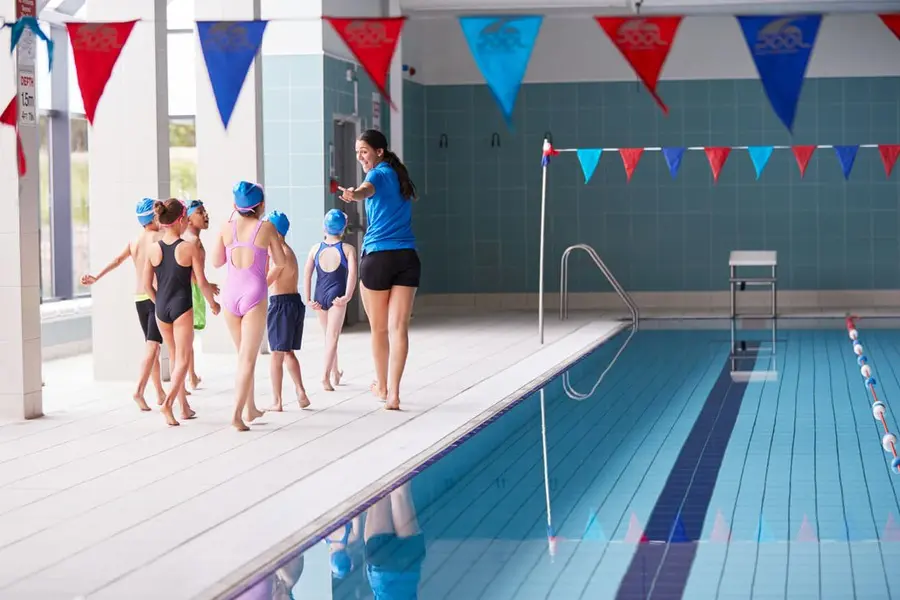
Swimming pools create important athletic, social, and learning areas for children of all ages. Depending on the country or region, its climate and sporting culture, pools designed for children are frequently available at sports clubs and recreation grounds. However, pools for schools are becoming increasingly popular.
Water activities, especially for the youngest of children, provide the opportunity to learn life skills and healthy habits. Whether integrated into the daily schedule or treated as an extra-curricular option, a swimming pool is an extremely valuable facility for students’ physical and mental health. This is why they’re increasingly commonplace at every stage of education, from primary right through to university age.
Swimming lessons can be integrated into the curriculum as either a sporting, educational, or leisure experience. High-performance training and other aquatic sports such as water polo, diving, or synchronised swimming are popular activities, and nowadays, specialised institutions offer Olympic and semi-Olympic pools for elite training in universities. In fact, some universities host official competitions such as the Summer Universiade Games in Taipei. Meanwhile, lap pools at primary schools are ideal for teaching young children to swim.
If you manage an educational institution, a swimming pool is a unique value-added offering to your student body. Here, we discuss why and outline what you need to consider when designing your establishment’s aquatic facilities.
Water activities have a positive impact on the physical and emotional well-being of children of all ages. These plus points are listed below, making a clear case for the advantages of pools for schools.
Sport and competition training
Swimming lessons in schools are a great way to introduce children to water sports at an early age. Starting early encourages excellence, allowing them to reach the performance level they need for future competitions. Quality facilities at universities are particularly important, as they allow students to alternate their studies with high-level competitions, carrying their sporting achievements into adulthood
Healthy habits
Even if children don’t go on to compete in water sports, swimming is also incredibly good for physical and mental health, and well-being. It’s one of the few activities that you can do at any age and with any ability. It provides a full-body workout that develops good muscle structure, improves breathing capacity, cardiovascular fitness, and blood circulation, and prevents injuries and poor posture. It’s a great option particularly for children with reduced mobility, as it has a low bone articulation impact with a low chance of injury.
Social skills
It’s important for kids to learn valuable social skills. Pools are a great place for young children to play together and be entertained. For older children, it’s also a great place to train and encourage one another, as well as nurturing team spirit and some healthy competition.
Safety
Drowning is one of the most common causes of accidental death in children. All children should have the opportunity to learn how to swim and be taught how to stay safe in and around water. This is why it is so important for schools to provide the best possible swimming and water safety provision for all of their students, so they can swim safely in their leisure time.
As these benefits imply, the design of swimming pools for educational establishments depends on the users’ age range, its intended use, and the school’s budget. Moreover, schools and aquatic centres have a legal responsibility to provide a healthy and safe environment for children to participate in water sports. Therefore, apart from the pool’s typology, size, and depth, the facility must be designed according to the corresponding national regulations.
For younger children, there are also considerations with regards to temperature. Although in most cases it will only be two or three degrees warmer than a regular adult’s pool, this needs to be carefully controlled for safety and comfort. Meanwhile, to effectively clean the pool water, the design must include:
- Efficient water recirculation
- Filtration and disinfection systems (such as Neolysis or Freepool, offered by Fluidra)
- UV disinfection systems for air quality
- Dehumidification systems to control air humidity
- Water and air heating and cooling systems
- Lighting
- Anti-slip materials, etc.
In addition, with innovative smart systems like Fluidra Connect, facility operators can control the parameters of the facility’s temperature and hygiene in a simple, automated way
Fluidra is an expert in the design of pools for schools of all sizes and educational stages, working with clients globally. Plus, with Fluidra’s patented lightweight, modular panels – Skypool – new or refurbished pools are more affordable than ever, with remarkable ease of installation.
Our projects include:
- Newlands Girls School, Maidenhead, United Kingdom
- Steve Parry School, Liverpool, United Kingdom
- International School Of Pelita Harapan Pool, Karawaci, Indonesia
- Natatorio Colegio Northlands Nordelta, Buenos Aires, Argentina
- St. Ambrose School, Manchester, United Kingdom
- The Medical University of Warsaw Pool, Warsaw, Poland
This is just a sample of the high-quality institutions we’ve worked with to install aquatic facilities. No matter where you are based or the children you serve, contact us to discuss our options for pools for schools.

